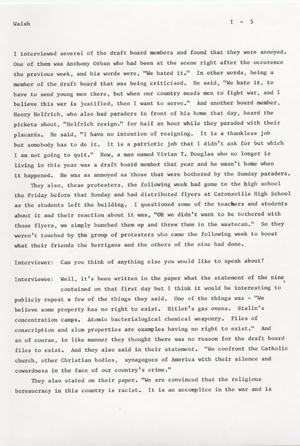 |
The Catonsville Nine's invasion and burning of the Catonsville draft board files: an interview with Jean S. Walsh given on March 30, 1973.
 |
9 / 15 |
 |



| Collection: |
Friends of Catonsville Library |
| Date: |
1973-03-30 |
| Date of Digitization: |
2004-03-31 |
| Source: |
Catonsville Library |
| Original Dimensions: |
28 x 22 cm |
| Creator: |
Walsh, Jean S. |
|
|
Description:
A transcript of a recorded interview with Jean S. Walsh, the editor of Catonsville's local newspaper, the Catonsville Times. She was present at the scene after the burning of draft records in Catonsville on May 17, 1968.
Transcription: I interviewed several of the draft board members and found that they were annoyed.
One of them was Anthony Orban who had been at the scene right after the occurence
the previous week, and his words were, "We hated it." In other words, being a
member of the draft board that was being criticised. He said, "We hate it, to
have to send young men there, but when our country needs men to fight war, and I
believe this war is justified, then I want to serve." And another board member,
Henry Helfrich, who also had paraders in front of his home that day, heard the
pickets shout, "Helfrich resign." for half an hour while they paraded with their
placards. He said, "I have no intention of resigning. It is a thankless job
but somebody has to do it. It is a patriotic job that I didn't ask for but which
I am not going to quit." Now, a man named Vivian T. Douglas who no longer is
living in this year was a draft board member that year and he wasn't home when
it happened. He was as annoyed as those that were bothered by the Sunday paraders.
They also, these protesters, the following week had gone to the high school
the Friday before that Sunday and had distributed flyers at Catonsville High School
as the students left the building. I questioned some of the teachers and students
about it and their reaction about it was, "Oh we didn't want to be bothered with
those flyers, we simply bunched them up and threw them in the wastecan." So they
weren't touched by the group of protesters who came the following week to boost
what their friends the Berrigans and the others of the nine had done.
Interviewer: Can you think of anything else you would like to speak about?
Interviewee: Well, it's been written in the paper what the statement of the nine
contained on that first day but I think it would be interesting to
publicly repeat a few of the things they said. One of the things was - "We
believe some property has no right to exist. Hitler's gas ovens. Stalin's
concentration camps. Atomic bacterialogical chemical weaponry. Files of
conscription and slum properties are examples having no right to exist." And
so of course, in like manner they thought there was no reason for the draft board
files to exist. And they also said in their statement. "We confront the Catholic
church, other Christian bodies, synagogues of America with their silence and
cowardness in the face of our country's crime."
They also stated on their paper. "We are convinced that the religious
bureaucracy in this country is racist. It is an accomplice in the war and is
|




